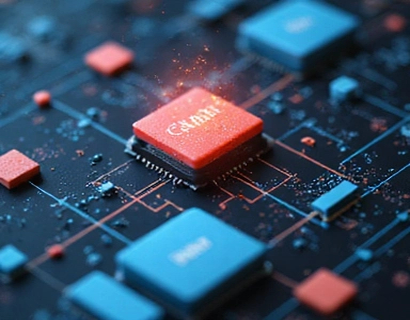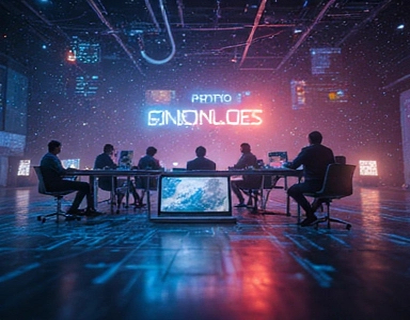Smart Contracts and Management Tools: Transforming Governance for Enhanced Democracy and Participation
In recent years, the intersection of technology and governance has given rise to innovative solutions aimed at enhancing democratic processes. Among these, smart contracts and advanced management tools stand out as transformative forces, promising to revolutionize the way decisions are made, transparency is ensured, and community engagement is fostered. This article explores the potential of these technologies to create a more inclusive and effective democratic system, making governance more accessible and efficient for individuals and organizations alike.
The Rise of Smart Contracts in Governance
Smart contracts, self-executing contracts with the terms of the agreement directly written into code, have been a cornerstone of blockchain technology. In the context of governance, they offer a unique opportunity to automate and enforce the rules and regulations that underpin democratic processes. By eliminating the need for intermediaries, smart contracts can reduce costs, increase efficiency, and minimize the potential for human error or manipulation.
One of the most significant advantages of smart contracts in governance is their ability to ensure transparency and accountability. Every transaction or agreement executed through a smart contract is recorded on a blockchain, a decentralized and immutable ledger. This means that all parties involved can verify the terms and outcomes of agreements in real-time, fostering trust and reducing the risk of corruption.
Enhancing Decision-Making Processes
Smart contracts can streamline decision-making processes by automating routine tasks and ensuring that decisions are made based on predefined criteria. For instance, in a municipal setting, smart contracts can be used to manage budget allocations, ensuring that funds are distributed according to the approved budget and timelines. This not only speeds up the process but also reduces the potential for political interference or mismanagement.
Moreover, smart contracts can facilitate more inclusive decision-making by enabling direct participation from the community. Through decentralized applications (dApps), citizens can propose, vote on, and execute decisions without the need for traditional bureaucratic channels. This direct democracy model can lead to more responsive and representative governance, as the voices of all community members are heard and considered.
Boosting Transparency and Trust
Transparency is a cornerstone of democratic governance, and smart contracts excel in this area. The immutable nature of blockchain ensures that once a contract is deployed, it cannot be altered or deleted. This permanence provides a clear and auditable trail of all transactions and decisions, making it easier to track the flow of resources and the execution of policies.
Additionally, smart contracts can integrate with other blockchain-based tools to enhance transparency further. For example, they can be linked to real-time data feeds, such as financial transactions or environmental metrics, allowing the public to monitor the impact of governance decisions in real-time. This level of transparency can significantly boost public trust in government institutions and officials.
Fostering Community Engagement
Community engagement is crucial for the health and vitality of democratic systems. Smart contracts and management tools can play a pivotal role in fostering greater participation by lowering the barriers to entry and making governance processes more accessible. dApps can be designed to allow citizens to propose and vote on local initiatives, participate in budget planning, and provide feedback on government services.
These tools can also facilitate the formation of community groups and coalitions, enabling collective action on issues of mutual concern. By providing a platform for collaboration and communication, smart contracts can help bridge the gap between citizens and government, fostering a more participatory and responsive governance model.
Challenges and Considerations
While the potential benefits of smart contracts and management tools in governance are significant, there are also challenges and considerations that must be addressed. One of the primary concerns is the technical complexity of these systems. Implementing smart contracts requires a certain level of technical expertise, which may be a barrier for some governments and organizations.
To overcome this, it is essential to invest in education and training programs that equip public officials and citizens with the necessary skills. Additionally, collaboration with tech experts and blockchain developers can help ensure that these systems are designed and implemented effectively.
Another consideration is the need for robust legal and regulatory frameworks to support the use of smart contracts in governance. Existing laws and regulations may not be fully equipped to handle the unique aspects of blockchain technology, such as decentralization and immutability. Governments must work to create a legal environment that encourages innovation while protecting the rights and interests of all stakeholders.
Case Studies and Real-World Applications
Several initiatives around the world are already leveraging smart contracts and management tools to enhance governance. One notable example is the city of Zug in Switzerland, which has become a hub for blockchain startups and has implemented blockchain-based solutions for various municipal services. The city uses smart contracts to manage property registries, ensuring transparency and efficiency in land transactions.
Another example is the use of smart contracts in voting systems. Estonia, a pioneer in digital governance, has implemented an e-voting system that uses blockchain technology to ensure the integrity and security of elections. This system allows citizens to cast their votes online, increasing participation and reducing the risk of fraud.
The Future of Governance: A Collaborative Approach
The integration of smart contracts and management tools in governance represents a significant step towards a more inclusive, transparent, and efficient democratic system. By automating processes, enhancing transparency, and fostering community engagement, these technologies have the potential to transform the way governance is conducted.
However, the success of these innovations depends on a collaborative approach involving governments, tech experts, and the community. It is essential to involve all stakeholders in the design and implementation of these systems to ensure they meet the needs and expectations of the public. Through this collaborative effort, we can build a governance model that truly serves the people and upholds the principles of democracy.
In conclusion, smart contracts and management tools offer a promising path forward for governance, enabling more effective, transparent, and participatory decision-making. As these technologies continue to evolve, their role in shaping the future of democracy will only become more significant. By embracing these innovations, we can create a more equitable and responsive governance system for all.











































